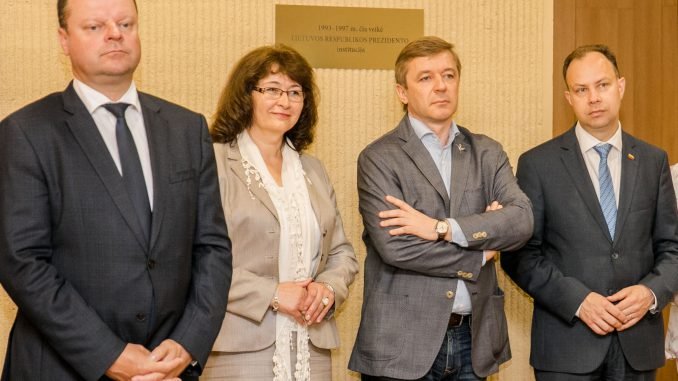
There are no specific reasons why the voters who voted for the “Farmers” are punishing them in the ratings now; there were expectations of change, for things to get better, but this did not materialise. This is what political scientist Ainė Ramonaitė tells LRT.lt. “It is easy to disappoint such voters because they simply have large expectations, a lack of specific programme motives, which the party would respond to,” she says. Meanwhile sociologist Vladas Gaidys points out that among the voters’ expectations there were higher wages, lower prices, emigration and corruption, but it would appear that the hopes were not fulfilled.
The decline in ratings has been painful for the Lithuanian Farmer and Greens Union (LVŽS) and its politicians. Based on the latest surveys the “Farmer” ratings are declining for the seventh month in a row now – 13% of voters would support them (or 22% of those who came to the elections). “Farmer” leader Ramūnas Karbauskis had support from as many voters half a year ago, as do not support him now. What did the voters vote for last time and what expectations were so disappointed, as reflected in the ratings?
Expected better
Vilnius University Institute of International Relations and Political Science (VU TSPMI) professor A. Ramonaitė says that it would be hard to specify specific reasons and expectations why voters supported the LVŽS.
“During the post-election survey we posed an open question – why the person supported the party they did. Those who voted for the “Farmers” could be identified as the disappointed, but hopeful. Their main answer was that they expect change – “Perhaps things will be better.”
This was just like buying a lottery ticket – “all of the other parties have been tried, we know they are nothing good, but this one is new, perhaps it will prove worthy.” It is easy to disappoint such voters because they simply have large expectations, a lack of specific programme motives, which the party would respond to,” A. Ramonaitė says.
According to the expert, there is little reason to expect that the voters have a clear view of what is wrong and what specifically needs to be done. The people are simply not sufficiently familiar with the Labour Code for example, to know what needs changing in it. Most often, she points out, it is a general hope for better living standards and politicians are those who have to know how to achieve this.
“It would appear they do not feel they have drawn a lucky lottery ticket and this is reflected in the ratings. Truth be told there were people who mentioned they hope that the alcoholism problem will be dealt with, now they are angry that alcohol prices are on the rise. This is somewhat controversial – they want something done, but are unwilling to pay the price,” A. Ramonaitė says.
Unfulfilled expectations regarding wages, lower prices and emigration
Public opinion and market research centre Vilmorus head, sociologist V. Gaidys says that while the “Farmer” ratings have taken a blow, they remain popular. He also points to certain expectations that may not have been fulfilled.
“R. Karbauskis’ ratings have fallen scandalously – being one of the most popular politicians in Lithuania in December with 52% support, now he is not supported by the same percentage. The party’s support has been halved, but for now it remains one of the most popular parties. The reduced ratings of Saulius Skvernelis still allow him to remain one of the most popular politicians in Lithuania. Increasingly many ministers are in the negative, but ministers from the previous cabinet fared no better in the ratings.
However the ratings changes clearly show that the voters did not receive what they expected. When we performed research prior to the elections, the most pertinent problems that voters stated the new government should resolve were the following: low wages, high prices, emigration, alcoholism and corruption. There was hope for new professionals, who would speak less and know what to do,” V. Gaidys explains.
According to him the decisions regarding the Labour Code, or more precisely – avoiding them, reduced school holidays, removal of the VAT exemption for heating – all of this has had a price in the popularity ratings. A part of the decisions regarding alcohol control have, according to Gaidys, appealed to voters, but the increased prices have not.
“The LVŽS leader R. Karbauskis is much changed, he once had high ratings, commented much in the media, you could see he wanted to express himself. Meanwhile now he is far less present in the public sphere, far less, and he is now associated with personal problems. This is not what the people expected, they hoped that their serious problems would be dealt with,” the sociologist said.

Be the first to comment